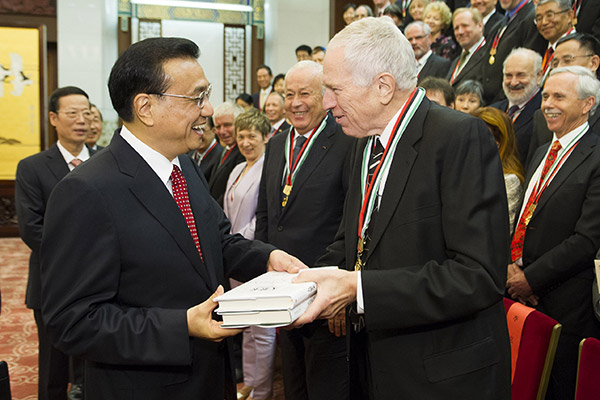
Premier Li Keqiang greets foreign experts during the 2014 Friendship Award ceremony at the Great Hall of the People in Beijing. The awards are top honors for overseas professionals who have contributed to China’s social and economic development. [Photo/Xinhua]
In recent years, the Chinese leadership has expressed its eagerness to bring more talented people from overseas to work in the country.
Known as “foreign experts” in government parlance, overseas professionals have made direct and indirect contributions to policymaking since the 1980s. In the past five years, China has witnessed more than 3 million of these visitors.
President Xi Jinping has emphasized that China should be a country that learns from others and uses talent without prejudice about people’s origins or backgrounds.
Below, we highlight the contributions of several foreigners who have worked closely with the government at different levels to improve the country’s economic and social prospects.
Isabel Crook: Education
The 101-year-old Chinese-born educator was one of the first foreigners to teach at a Chinese university, and as such she witnessed the country’s transition from war to peace and poverty to development. Born to a Canadian missionary family in the southwestern province of Sichuan, Crook spent part of her youth in China.
After completing her university studies in Canada, Crook undertook anthropological research in rural Sichuan in 1939. When New China was founded a decade later, she began teaching English in Beijing. Over the years, she has advised the government on programs for rural education.
In 1995, Crook suggested to then-president Jiang Zemin that a woman rather than a man should be put in charge of the World Conference on Women that was shortly to be held in Beijing. An announcement to that effect was made the following day.
“I was very pleased and impressed that the leaders would see it so quickly, admit the fact and go ahead and correct it,” Crook said.
Fredmund Malik: Management
The Austrian management guru advocates management systems to the Chinese government and also to companies. Malik has been advising officials on improving governance since his first visit in 1998. During a recent trip, he gave Premier Li Keqiang a copy of his book Strategy: Navigating the Complexity of the New World, and last year he provided feedback on the draft of the Government Work Report.
“It’s quite a decent work to invest my time in. That’s important for this country, and it’s a duty with great responsibility attached,” the 72-year-old said.
Malik has delivered lectures at the Central Party School and is a visiting professor at a number of Chinese universities, in addition to working as a consultant for the governments of several cities.
Daniel Dudek: Environment
According to the US environmentalist, China has made steady progress in its environment policies. The 69-year-old, who has devoted himself to environmental work for years, is vice-president of the Environmental Defense Fund, a US-based nonprofit organization.
Since the 1990s, Dudek’s organization has worked with the Chinese government to successfully conduct trials of a system that aims to control atmospheric pollutants through the use of market mechanism. At a time when the top leadership is talking about an ecological civilization, his ideas have great resonance in China.
“By now I have no doubt what is going to happen, it’s really a question of details,” Dudek said, referring to China’s green transformation.
In 2007, he was appointed to the China Council for International Cooperation on the Environment and Development, a body that advises the government on sustainable development.
Colin Patrick Mackerras: Sinology
The Australian Sinologist first came to China with his wife to teach English in 1964, even though New China had yet to establish diplomatic relations with his homeland. Since that first trip, Mackerras has visited the country many times writing books and academic papers highlighting the views of China and the West.
The 77-year-old also established the Chinese Studies Association of Australia to boost exchanges, and has documented the West’s changing attitudes toward China. According to Mackerras, there has been significant improvement in relations between Australia and China in recent years. China is now Australia’s top trading partner, and cultural and educational exchanges have grown rapidly.
Gilbert van Kerckhove: Business
The Belgian business strategist has not only witnessed but also played an important part in China’s transformation over many years.
The 68-year-old has lived in China on and off for more than 30 years, working mostly in Beijing, where he started a consultancy in 1999. His international background and business experience are valued by the capital’s municipal authorities, especially in the field of foreign-investment promotion.
Ahead of the 2008 Beijing Olympics, he helped the city government with fundraising, tendering and economic planning.
“My approach is simple. I offer what is good and bad for them, and give opinions honestly and complain constructively. Then I offer solutions and start working,” he said.
